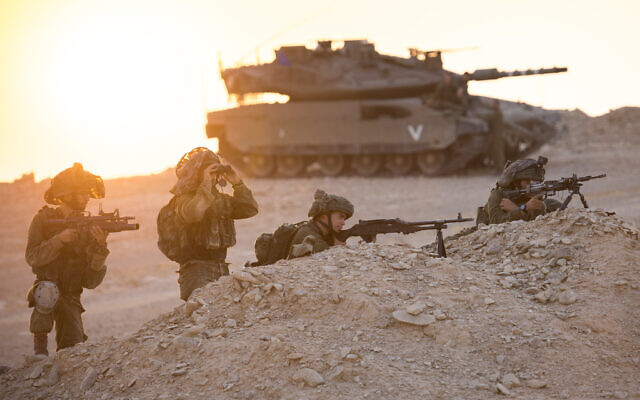The Israeli Defense Forces (IDF) are not subtle when it comes to their archenemy Hezbollah. And when they saw a high-ranking Syrian officer touring Hezbollah units in the Golan Heights region, they didn’t pull any punches.
The IDF released on Twitter a short, although somewhat grainy, video which they claimed depicted a visit by General Luau Ali Ahmad Assad, commander of Syrian Armed Forces 1st Corps, accompanied by Hezbollah’s southern commander Hajj Hashem, to one of Hezbollah’s bases inside of Syria. “We see you. Consider this a warning,” IDF said in their Twitter post.
Avichay Adraee, an IDF spokesman, said that the terrorist group was seeking to establish a “terror infrastructure” inside of Syria to attack Israel. He issued the familiar warning that Israel will hold the Assad regime accountable for any violence perpetrated by Hezbollah.
“Hezbollah’s presence in Syria in general and in the Syrian part of the Golan Heights in particular aims to create a terrorist infrastructure against the State of Israel with the cooperation and care of the Syrian regime,” tweeted Adraee, warning that Israel “will not tolerate this entrenchment!”
The Jerusalem Post reported that:
Hajj Hashem, the Hezbollah commander mentioned by Adraee, was identified as Munir Naima Ali Shaito in a report by the Jerusalem Center for Public Affairs (JCPA). Shaito is in charge of recruiting locals in southwest Syria with financial incentives, with 3,500 local Syrians joining Hezbollah’s ranks since mid-2018, according to the report.
The terrorist group has been developing its “Golan Project,” since about a year ago after government troops loyal to Assad pushed out rebels that had been holding the Syrian parts of the Heights. The Golan Project has dozens of operatives in Hadar, Quinetra, and Erneh. They are actively collecting intelligence on IDF’s movements on the Israeli side of the Golan Heights.
Already have an account? Sign In
Two ways to continue to read this article.
Subscribe
$1.99
every 4 weeks
- Unlimited access to all articles
- Support independent journalism
- Ad-free reading experience
Subscribe Now
Recurring Monthly. Cancel Anytime.
Hashem has also been involved in the Syrian Civil War since Hezbollah joined the fighting in 2013. He was the deputy head of the Operational Unit for Palestine back in 2000 and was promoted to the position of deputy commander of the elite Badr unit after the Second Lebanese War.
About a week ago, Ali Muhammad Younes, a key Hezbollah military commander was found dead near the southern village of Nabatieh. Younes who was responsible for “tracking spies and collaborators,” was described by the Shia militia as a “martyr” in his obituary. Lebanese security officials said he was found by his car; he had been stabbed twice and shot four times. They said that a man has been arrested in connection with the killing, and another man was wanted. Initially, Hezbollah posted that Younes was killed by an Israeli drone strike.
The IDF and the Israeli government have long made it very clear that they will not accept any Iranian bases on their border. With Hezbollah being created by the Iranian Quds Forces in the aftermath of the 1982 war in Lebanon, Israel and Hezbollah have constantly been in conflict.
Every time an Iranian or Hezbollah unit gets close to the border with Israel, the IDF has struck. This will not change. So, the visit of the Syrian Corps’ commander has the potential to further increase the violence in the region.










COMMENTS